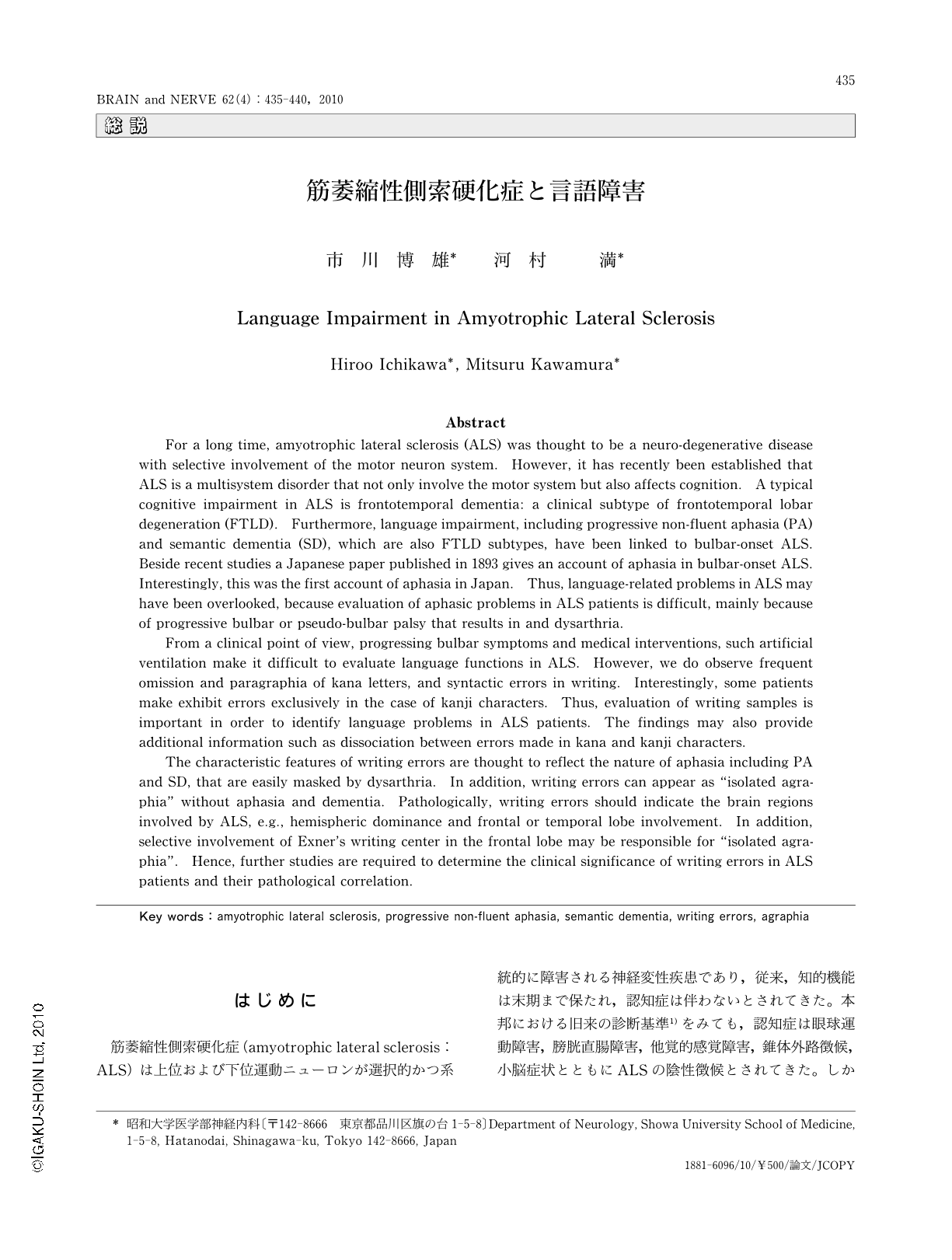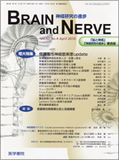Japanese
English
- 有料閲覧
- Abstract 文献概要
- 1ページ目 Look Inside
- 参考文献 Reference
はじめに
筋萎縮性側索硬化症(amyotrophic lateral sclerosis:ALS)は上位および下位運動ニューロンが選択的かつ系統的に障害される神経変性疾患であり,従来,知的機能は末期まで保たれ,認知症は伴わないとされてきた。本邦における旧来の診断基準1)をみても,認知症は眼球運動障害,膀胱直腸障害,他覚的感覚障害,錐体外路徴候,小脳症状とともにALSの陰性徴候とされてきた。しかし,1960年代以降,認知症を伴うALS(ALS with dementia:ALS-D)例が本邦を中心に報告され,湯浅・三山型ALSとしても知られてきたが2-6),ごく最近になり,ALSと認知症性疾患である前頭側頭葉変性症(frontotemporal lobar degeneration:FTLD)7-10)の一部が同じ疾患スペクトラムに属することが証明された11-14)。すなわち,1869年のCharcotとJoffrovの発表以来100年の歴史を有するALS15)の常識が否定されたと言える。
それでは,認知機能の一面である言語機能についてはどうであろうか。ALSでは上位および下位運動ニューロン障害として四肢の運動障害を呈することに加え,球麻痺あるいは偽性球麻痺による構音障害を伴うことが多く,一部の患者ではこれらが初期症状ともなる。ALSにおける言語障害については,後述する歴史的記載があるものの,ALSにおける構音障害に隠ぺいされ,認知症以上に見過ごされてきた可能性がある16,17)。本稿では,ALSにおける構音障害とは別に,失語症的側面に焦点をあてて述べてみたい。
Abstract
For a long time, amyotrophic lateral sclerosis (ALS) was thought to be a neuro-degenerative disease with selective involvement of the motor neuron system. However, it has recently been established that ALS is a multisystem disorder that not only involve the motor system but also affects cognition. A typical cognitive impairment in ALS is frontotemporal dementia: a clinical subtype of frontotemporal lobar degeneration (FTLD). Furthermore, language impairment, including progressive non-fluent aphasia (PA) and semantic dementia (SD), which are also FTLD subtypes, have been linked to bulbar-onset ALS. Beside recent studies a Japanese paper published in 1893 gives an account of aphasia in bulbar-onset ALS. Interestingly, this was the first account of aphasia in Japan. Thus, language-related problems in ALS may have been overlooked, because evaluation of aphasic problems in ALS patients is difficult, mainly because of progressive bulbar or pseudo-bulbar palsy that results in and dysarthria.
From a clinical point of view, progressing bulbar symptoms and medical interventions, such artificial ventilation make it difficult to evaluate language functions in ALS. However, we do observe frequent omission and paragraphia of kana letters, and syntactic errors in writing. Interestingly, some patients make exhibit errors exclusively in the case of kanji characters. Thus, evaluation of writing samples is important in order to identify language problems in ALS patients. The findings may also provide additional information such as dissociation between errors made in kana and kanji characters.
The characteristic features of writing errors are thought to reflect the nature of aphasia including PA and SD,that are easily masked by dysarthria. In addition,writing errors can appear as "isolated agraphia" without aphasia and dementia. Pathologically,writing errors should indicate the brain regions involved by ALS,e.g.,hemispheric dominance and frontal or temporal lobe involvement. In addition,selective involvement of Exner's writing center in the frontal lobe may be responsible for "isolated agraphia". Hence,further studies are required to determine the clinical significance of writing errors in ALS patients and their pathological correlation.

Copyright © 2010, Igaku-Shoin Ltd. All rights reserved.


